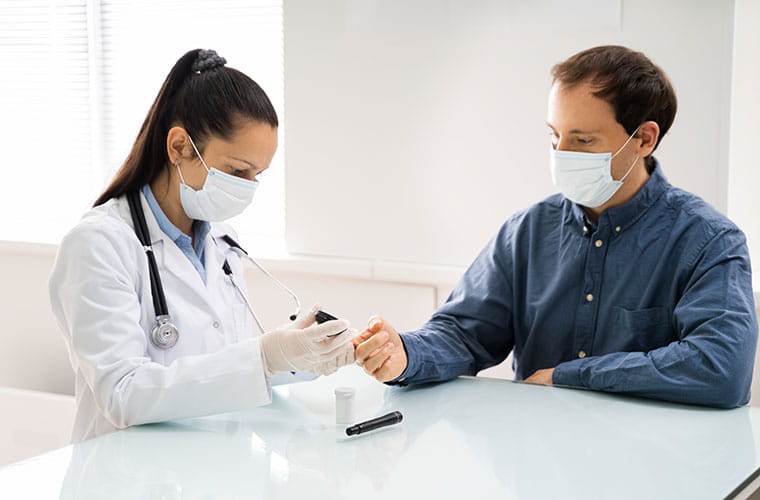Diabetes: Separating Fact and Myth

November is National Diabetes Awareness Month, a chance to shine a brighter light on this disease that strikes millions each year. Venkata Budharaju, MD, medical director of the Diabetes Program at St. Anthony’s Hospital in St. Petersburg, is a board-certified endocrinologist at Florida Endocrinology & Diabetes Center in Pinellas County. During his career, he has treated hundreds of patients with Type 1 and Type 2 diabetes. He focuses his treatment on lifestyle changes, weight management, complications prevention and the use of technology in diabetes care.
While it’s good to have this month that is diabetes-focused, it’s important to think about diabetes throughout the year, Dr. Budharaju said. “This year marks the 100-year anniversary of the discovery of insulin,” he said. “The American Diabetes Association (ADA) is focusing on driving awareness for the 1 in 5 adults who are living with diabetes but don’t yet know it. The more diabetes information we provide, we have a better chance to inform those who may not know they have the disease.”
Separating fact from fiction is a good way to get the correct information out, Dr. Budharaju said. Here are a few facts and some myths that will help those who may have the disease and their family and friends who will help them on their diabetes journey.
FACT: Diabetes is a chronic health condition that affects more than 30-million adults in the United States, according to the Centers for Disease Control and Prevention (CDC). In addition, prediabetes – a serious health condition in which blood sugar levels are higher than normal, but not high enough yet to be diagnosed as Type 2 diabetes – affects more than 1 in 3 U.S. adults — that’s 88 million people. And the majority of them don’t know they have it, Dr. Budhuraju said.
MYTH: People suffering with diabetes can’t eat sugar. Because people with Type 2 diabetes should eat a healthy diet, these diets already are generally low in sugar. Because of that, it may not be necessary to avoid sugar entirely, Dr. Budharaju said. For example, fruits contain fructose, which is a type of sugar, but they also provide fiber and many vitamins and minerals, he said. “Eating in moderation is a good rule for everyone to follow,” he said. The ADA urges people with diabetes to include fresh, frozen or canned fruits with no added sugar in their diet.
FACT: Early detection helps prevent life-altering complications. “Diet, exercise, education and technology can make living with diabetes more manageable,” Dr. Budharaju said. “Since this is National Diabetes Awareness Month, this would be a good time to start a fitness program, look for healthy recipes and find information about diabetes technology that is available.”
MYTH: Once a person with Type 2 diabetes starts taking insulin, he or she can never stop. In fact, by adhering to a strict low-carbohydrate diet and losing weight, Dr. Budharaju said, it is possible for a patient to safely stop insulin therapy providing the patient is under close supervision and support from a health care provider.
FACT: Swapping out real sugar with sweeteners or choosing “sugar-free” foods does not mean a food is carbohydrate free, Dr. Budharaju said. These foods may contain sugar alcohols, which can increase your blood glucose levels. By understanding food labels, counting carbohydrates and developing a meal plan, Dr. Budharaju said, diabetes patients can maintain normal blood glucose levels.
MYTH: Only overweight people suffer with Type 2 diabetes. It is possible to have Type 2 diabetes without being overweight or obese, Dr. Budharaju said. “About 12.5 percent of adults with Type 2 diabetes are not overweight,” he said. “A lean adult who presents with new-onset diabetes could possibly have latent autoimmune diabetes, which people sometimes refer to as “Type 1.5” diabetes.
If you have received a diabetes diagnosis or are prediabetic, BayCare offers many programs to help with management while also presenting lectures and seminars on prevention. These events are available both in the inpatient and outpatient setting.
- Structured diabetes education and nutrition programs are offered at 14 different BayCare facilities across the Tampa Bay area. These programs, all accredited by the ADA, offer classes, workshops and self-management services. Some of these programs include the One-on-One education appointments with a dietitian and nurses who are Certified Diabetes Educators; prediabetes workshops and education programs; diabetes management classes including diabetes counseling during pregnancy; and nutrition counseling and meal planning. Many of these classes also are offered in Spanish.
- There are free community lectures that cover a variety of diabetes health promotion topics. These programs are offered throughout the year and are currently held virtually.
- The free Diabetes Education Empowerment Program (DEEP) is a six-week class that teaches people to take charge of their diabetes. Attendees meet in small groups once a week for two hours and have the option to meet one-on-one with a BayCare diabetes educator. Read about one woman’s success through the program.
- The four-week program called “The Journey for Control: A Diabetes Management Class” uses Conversation Maps, a series of images and metaphors, to engage people in conversations about diabetes and prediabetes health topics. The program helps participants devise an action plan to make lifestyle and behavior changes.
- There also is a Prediabetes Education Program with one-hour classes featuring 12 unique topics over a 12-week span. Participants learn what lifestyle changes can reduce the risk for developing diabetes. Email support with a licensed clinician is provided for 30 days following the program.
To learn more about BayCare’s diabetes education and management programs, click here.
